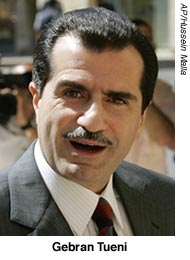Qassir’s killers still at large after one year
New York, June 1, 2006—A year after Lebanese journalist Samir Qassir was murdered in a Beirut car bombing those responsible remain at large. The Committee to Protect Journalists reiterates its call to Lebanese authorities and the international community to work urgently to bring to justice those behind Qassir’s murder, and the murder and maiming of…
Lebanese journalists face charges of defaming president
New York, March 2, 2006—The Committee to Protect Journalists is alarmed by criminal charges filed against the daily Lebanese newspaper Al-Mustaqbal, its editor-in-chief, and a staff reporter for defaming President Emile Lahoud. The charges were brought by Beirut prosecutor Joseph Me’mari on Tuesday, four days after Al-Mustaqbal published an interview with former Lebanese ambassador to…
Attacks on the Press in 2005: Headlines
January 11: A killing in Colombia reinforces self-censorship — Gunmen kill radio news host Julio Hernando Palacios Sánchez as he drives to work in Cúcuta. Attacked from all sides, the Colombian press censors itself to an extraordinary degree, CPJ later reports. Probing journalists are killed, detained, or forced to flee. Verified news is suppressed, and…
Attacks on the Press in 2005: Introduction
By Ann CooperOn May 2, when the Committee to Protect Journalists identified the Philippines as the world’s most murderous country for journalists, the reaction was swift. “Exaggerated,” huffed presidential spokesman Ignacio Bunye, who was practiced at dismissing the mounting evidence. He had called an earlier CPJ analysis of the dangers to Philippine journalists “grossly misplaced…
Attacks on the Press 2005: Middle East Analysis
In the Crosshairs, Journalists Face New Threat By Joel Campagna The bomb that ripped through Samir Qassir’s white Alfa Romeo on June 2, 2005, silenced Lebanon’s most fearless journalist. For years, Qassir’s outspoken columns in the daily Al-Nahar took on the Syrian government and its Lebanese allies when few reporters dared do so. The assassination sent shockwaves…
Attacks on the Press 2005: Lebanon
LEBANON n the popular uproar that followed the assassination of former Prime Minister Rafiq al-Hariri in February 2005, Lebanon’s press, already among the most vibrant in the Arab world, hoped for greater freedom. But a series of bomb attacks on journalists who dared criticize Syria and its Lebanese allies quickly demonstrated that the old order…
CPJ urges Annan to widen murder probe to attacks on 3 journalists
New York, December 16, 2005—The Committee to Protect Journalists today urged United Nations Secretary-General Kofi Annan to work to broaden a U.N. investigation into the murder of former prime minister Rafiq al-Hariri to include bomb attacks on three Lebanese journalists. The United Nations Security Council authorized Annan on Thursday to make recommendations for expanding the…

CPJ condemns killing of Al-Nahar columnist and manager
New York, December 12, 2005—The Committee to Protect Journalists condemns the assassination today in Beirut of Gebran Tueni, a journalist and member of parliament who was a fierce critic of Syria and its policies in Lebanon. Tueni, 48, was managing director of Lebanon’s leading daily Al-Nahar. A parked car exploded as Tueni’s armored vehicle drove…
CPJ urges UN to expand Lebanon inquiry to include journalist attacks
Your Excellency: The Committee to Protect Journalists urgently calls on the United Nations Security Council to expand its current probe into the February 2005 murder of former Lebanese Prime Minister Rafiq al-Hariri to include alarming, unsolved attacks against Lebanese journalists in recent months.